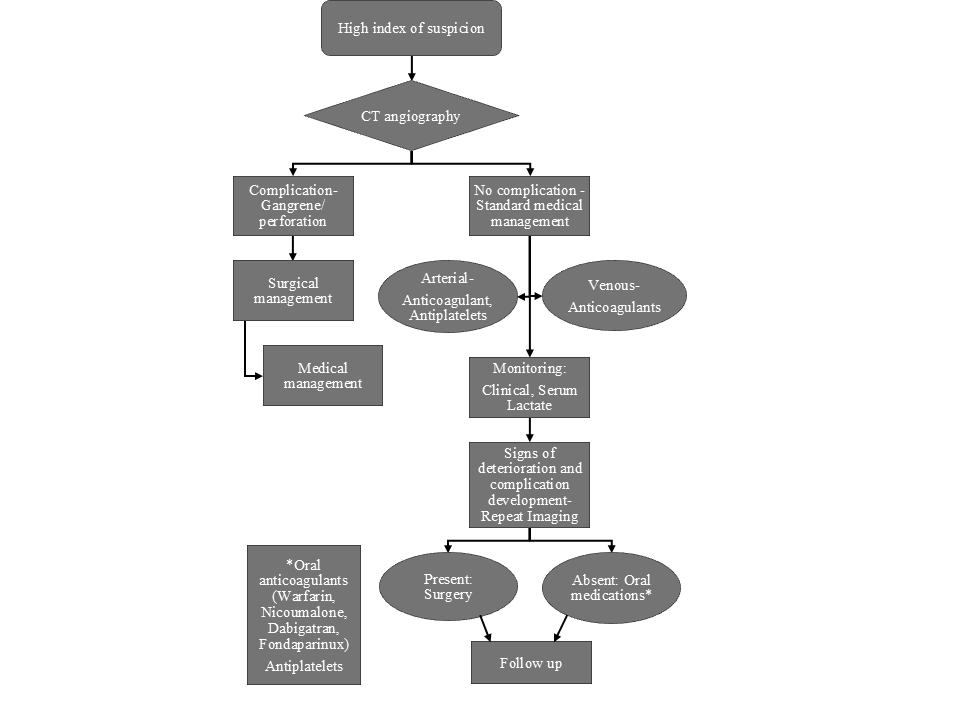Tuesday Poster Session
Category: Small Intestine
P6217 - Can Early Medical Management Alter the Natural History of Mesentric Ischemia? Experience From a Tertiary Care Center
Tuesday, October 28, 2025
10:30 AM - 4:00 PM PDT
Location: Exhibit Hall
- RW
Rajkumar P. Wadhwa, MD (he/him/his)
Apollo BGS Hospitals
Mysore, Karnataka, India
Presenting Author(s)
Shantanu Anant Shahane, MD, Rajkumar P. Wadhwa, MD, Aathira Ravindranath, MD, Kushan Sengupta, MD, Rakesh JP, MD, Snigdha Singh, MBBS
Apollo BGS Hospitals, Mysore, Karnataka, India
Introduction: Mesentric ischemia manifests in acute and chronic forms. We need to be prompt to identify and manage these cases as acute mesentric ischemia (AMI) has been associated with complications requiring surgery in 70-90% and a mortality of more than 50% as per Western literature. We have observed the scenario to be different in our center where more cases of mesentric venous ischemia are seen and with significantly less morbidity and mortality. this study was initiated to look at the Indian perspective of AMI and to ascertain if early medical management can change the outcome.
Methods: Study
Design: This is an observational study where the data was collected from a prospectively maintained database over 5 years ( 2020-2025) at a tertiary care gastroenterology center.
Inclusion Criteria: Patients more than 18 years with confirmed mesentric ischemia on contrast-enhanced computed tomography (CECT) abdomen or angiography.
Study place: Apollo BGS Hospitals, Mysore.
Management protocol: As per figure 1.
Results: We included 32 patients (23 males) aged 54.5 years (21-82) with acute mesentric ischemia. Presenting symptoms were abdominal pain- 31(96.9%), nausea and vomiting-20(62.5%), abdominal distension- 12(37.5%), constipation- 8(25%), diarrhea- 6(21.85%) and melena-5(15.6%). Duration of symptoms before presentation was 5 days (1-20). Comorbidities included diabetes mellitus- 11(34.37%), hypertension- 10(31.25%), hypothyroidism-2(6.25%), stroke- 2(6.25%), and ischemic heart disease- 1(3.12%). Arterial involvement was noted in 8(25%), venous in 21(65.6) and both in3(9.4%). Bowel involvement was observed in 24(75%)- wall thickening- 20(62.5%), gangrene- 7(21.9%), perforation- 5(15.6%).
On the day of presentation heparin or enoxaparin and/or aspirin were started. Patients were monitored for development of bowel gangrene/ perforation. Medical management failed in 12 (37.5%) of which 8(25%) required surgery, 2(6.25%) died. On oral anticoagulants and/or antiplatelets patients remained asymptomatic over a follow-up period of 237.5 patient-months.
Discussion: As compared to previous literature, our study showed less mortality amongst the patients with mesentric ischemia. We also did a subgroup analysis for mesentric arterial ischemia and found the mortality to be lower in our study.
Conclusion: Early medical management in mesentric ischemia reduces complications, requirement of surgery and mortality.

Figure: Mesentric ischemia - Management protocol
Disclosures:
Shantanu Anant Shahane indicated no relevant financial relationships.
Rajkumar Wadhwa indicated no relevant financial relationships.
Aathira Ravindranath indicated no relevant financial relationships.
Kushan Sengupta indicated no relevant financial relationships.
Rakesh JP indicated no relevant financial relationships.
Snigdha Singh indicated no relevant financial relationships.
Shantanu Anant Shahane, MD, Rajkumar P. Wadhwa, MD, Aathira Ravindranath, MD, Kushan Sengupta, MD, Rakesh JP, MD, Snigdha Singh, MBBS. P6217 - Can Early Medical Management Alter the Natural History of Mesentric Ischemia? Experience From a Tertiary Care Center, ACG 2025 Annual Scientific Meeting Abstracts. Phoenix, AZ: American College of Gastroenterology.
Apollo BGS Hospitals, Mysore, Karnataka, India
Introduction: Mesentric ischemia manifests in acute and chronic forms. We need to be prompt to identify and manage these cases as acute mesentric ischemia (AMI) has been associated with complications requiring surgery in 70-90% and a mortality of more than 50% as per Western literature. We have observed the scenario to be different in our center where more cases of mesentric venous ischemia are seen and with significantly less morbidity and mortality. this study was initiated to look at the Indian perspective of AMI and to ascertain if early medical management can change the outcome.
Methods: Study
Design: This is an observational study where the data was collected from a prospectively maintained database over 5 years ( 2020-2025) at a tertiary care gastroenterology center.
Inclusion Criteria: Patients more than 18 years with confirmed mesentric ischemia on contrast-enhanced computed tomography (CECT) abdomen or angiography.
Study place: Apollo BGS Hospitals, Mysore.
Management protocol: As per figure 1.
Results: We included 32 patients (23 males) aged 54.5 years (21-82) with acute mesentric ischemia. Presenting symptoms were abdominal pain- 31(96.9%), nausea and vomiting-20(62.5%), abdominal distension- 12(37.5%), constipation- 8(25%), diarrhea- 6(21.85%) and melena-5(15.6%). Duration of symptoms before presentation was 5 days (1-20). Comorbidities included diabetes mellitus- 11(34.37%), hypertension- 10(31.25%), hypothyroidism-2(6.25%), stroke- 2(6.25%), and ischemic heart disease- 1(3.12%). Arterial involvement was noted in 8(25%), venous in 21(65.6) and both in3(9.4%). Bowel involvement was observed in 24(75%)- wall thickening- 20(62.5%), gangrene- 7(21.9%), perforation- 5(15.6%).
On the day of presentation heparin or enoxaparin and/or aspirin were started. Patients were monitored for development of bowel gangrene/ perforation. Medical management failed in 12 (37.5%) of which 8(25%) required surgery, 2(6.25%) died. On oral anticoagulants and/or antiplatelets patients remained asymptomatic over a follow-up period of 237.5 patient-months.
Discussion: As compared to previous literature, our study showed less mortality amongst the patients with mesentric ischemia. We also did a subgroup analysis for mesentric arterial ischemia and found the mortality to be lower in our study.
Conclusion: Early medical management in mesentric ischemia reduces complications, requirement of surgery and mortality.

Figure: Mesentric ischemia - Management protocol
Disclosures:
Shantanu Anant Shahane indicated no relevant financial relationships.
Rajkumar Wadhwa indicated no relevant financial relationships.
Aathira Ravindranath indicated no relevant financial relationships.
Kushan Sengupta indicated no relevant financial relationships.
Rakesh JP indicated no relevant financial relationships.
Snigdha Singh indicated no relevant financial relationships.
Shantanu Anant Shahane, MD, Rajkumar P. Wadhwa, MD, Aathira Ravindranath, MD, Kushan Sengupta, MD, Rakesh JP, MD, Snigdha Singh, MBBS. P6217 - Can Early Medical Management Alter the Natural History of Mesentric Ischemia? Experience From a Tertiary Care Center, ACG 2025 Annual Scientific Meeting Abstracts. Phoenix, AZ: American College of Gastroenterology.
